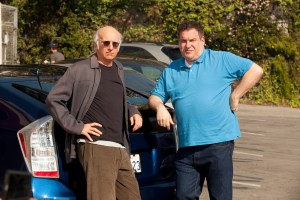
HBO
Spoiler alert: in this season of Curb Your Enthusiasm, a lot of people get really mad at Larry David.
All right, the spoiler alert is probably not necessary. When David and Jerry Seinfeld created Seinfeld, their mantra “No hugging, no learning” was a reaction against the good-hearted, sentimental sitcoms of the Cosby era. For the past decade, Curb has, in some ways, been the same principle taken to its logical extreme. But in 2011, you could also see it as a kind of retro throwback to the prevailing trend among critically praised comedies, both on cable and broadcast, toward the kind of serial stories that dramas used to tell.
Curb has had arcs, certainly—Larry starred in The Producers, Larry reunited with Jerry—and some circumstances change (the introduction of the Black family, e.g.) but at heart it’s always stayed the same, and its protagonist irascibly unaltered at heart. Its mantra, perhaps, could be “No evolving, no changing.”
The benefit of that attitude had been that, even if the show has had season-long stories, it’s been the kind of comedy that you can dip into and have a good time, without needing much prior knowledge. I can’t entirely say if that’s true this season, because the idiosyncratic David had HBO sent out three episodes out of airing sequence. But from what I’ve seen, the hook of this season—at some point, Larry and the gang go from L.A. to New York City—is not in the service of any kind of involved running plot. The theme of the newest season of Curb Your Enthusiasm returning to HBO Sunday, is really: Larry David makes more episodes of Curb Your Enthusiasm.
And that’s enough for me. The three episodes are a kind of sampler platter of Curb tropes: Larry gets enraged over some minor social transgression (to such sins as “regifting” this season adds the “chat and cut,” a means of jumping line), Larry is selfish, Larry gets in trouble over telling a lie, Larry (more often) gets in trouble over telling the truth. Above all, the samples show how well, now into eight seasons, the show’s ensemble has adapted to Curb’s improvisatory style of comedy, and to its method of weaving several subplots into a climactic avalanche of hilarious anger. (The new episode especially highlight the irreplaceable Susie Essman.)
Curb’s humor can be very broad and stereotyping, but it’s equal-opportunity broad stereotyping. One episode divides Larry’s mainly Jewish circle of friends and antagonists over a Palestinian chicken restaurant, which features delicious poultry and anti-Israeli posters. With ludicrous precision, it manages to lampoon both the Middle East situation and the controversy over the Islamic center near Ground Zero, as the chicken joint plans to open a branch next to a revered deli. (Curb has always been one of the most Jewish TV shows ever in sensibility, but this is one if it’s most Jewish episodes in literal content, right down to Funkhouser’s rediscovery of his religious roots.) The one New York episode sent—an intricate comic symphony weaving together World series goat Bill Buckner, a too-competitive softball game, psychotherapy and a risque car malfunction—is one of the funniest Curbs I have ever seen, and its ending is, surprisingly, almost sweet.
Like other seasons of Curb, this could be the last—at least, until David decides to make another again. In the meantime, Larry, don’t ever change. As if you ever would.


